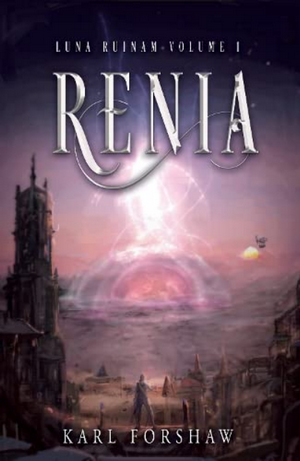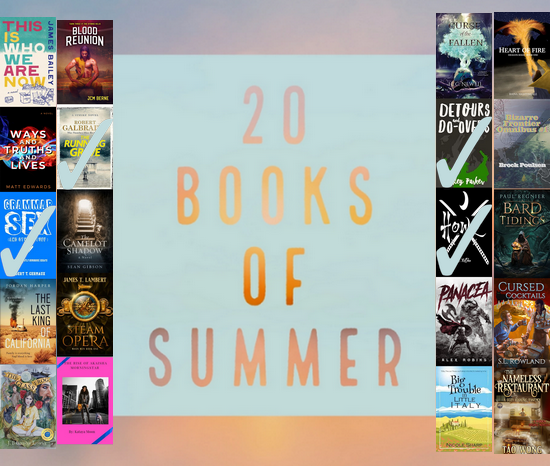The best part of getting this post finished (for me) is not that I’ve ticked off one more box on my “To Write” list, it’s that I can now move on to the third book in this series, Blood Reunion—which just might put me on target to catch up before this year ends.
by JCM Berne
DETAILS:
Series: Hybrid Helix, #2
Publisher: The Gnost House
Publication Date: February 26, 2022
Format: Hardcover
Length: 389 pg.
Read Date: February 1-7, 2024


But I spent ten years training and fighting for the il’Drach. There arg Maybe a quarter million il’Drach alive, total, and yet they control most of this sector, running an empire of trillions. You know how? Because they have developed a system for winning wars. Which they’ve been drumming into me for a decade…
“I’m not saying you should follow me out to Nevada because you’re my friends or because I’m a great guy or because you really like me. I’m saying you should follow me because it turns out I’m not such a great guy, and that’s why I’m the right person to help you win this war.”
What’s Return of The Griffin About?
We start off* with Rohan rescuing some people who were foolish enough to try to visit the surface of Toth 3, as a nice and efficient way to pick up where we left off and to show how the time since Wistful Ascending has gone for Rohan, Wistful, and the rest.
* Okay, fine. Truly we start with a prologue in a tense moment that happens two weeks later than that, and toward the end of the novel. But I complained enough about that when I talked about Wistful Ascending, so I’ll bite my tongue now.
After a great action-filled opening to the book, Rohan returns to Wistful to find some old friends/acquaintances from Earth waiting for him. They want his help in locating another Hybrid hero, the greatest superhero from Earth—who, like Rohan, left to fight for the il’Drach. Rohan can’t help them, he says, because he’s dead. (we learned this last time). They can’t believe that anyone could kill Hyperion and become certain that the Earth is doomed.
Giant, unbelievably giant, two-legged sharks that can breathe on land have emerged, one by one, from the Pacific. The first was killed after super-powered heroes and villains from Japan stopped it (and got some help)—between the creature, the fight, and the means used to destroy it, millions died. Including most—if not all—of the super-powered population of Japan. The second wipes out a similar number. The third was still alive when they left to find Hyperion.
I’m not sure how to capture the size of these two-legged sharks. But Ben Stone gets closest (and pithiest) by observing “they must be a thousand times as massive as the largest megalodon. More.”
Rohan volunteers to come back to Earth to help out. He’s not nearly as powerful as Hyperion, but he’s the only il’Drach/Human hybrid left—and the planet isn’t really in a place to turn away help. It’s time for Rohan to adopt the mask and the name of the superhero he no longer is.
So Rohan goes home, and in addition to fighting freakishly giant land sharks, he sees his mom. He deals with the fallout of his departure from Earth (and the events leading up to it) legally and with his former friends, allies, and others. And a few other challenges, too. In fact, the unbelievably large land sharks might not be the biggest challenge he has to face.
The Kirkman Is Strong In This One
“Well, can you give me any ideas on how to fight these things? They’re tearing us apart.”
“I would fight it on land, if I were you. Even regular sharks are frightening in the water. Get that up on land. There your chances go from zero to a multiple of zero.”
“That’s still zero.”
Poseidon waved his bottle in the air.
“Math is not always your friend, my friend.”
I don’t want to overstate things here, nor am I trying to suggest that Berne is leaning too heavily on Invincible. But I thought of Invincible often when reading this—more often than I did last time.
You know how Kirkman would introduce a character, imbue them with a catchy (possibly goofy) name, and some cool powers, and then kill them in just a few panels? Over and over again?* Well, that’s what Berne does here—I said above that super-powered heroes and villains are dying taking on these sharks, right? I meant it—and I’d have willingly read books/stories/series featuring most, if not all, of them.
* And I’m sure there are other comic writers I could reference here, but I’m not steeped enough in them to do that. Feel free to tell me who I’m not thinking of in the comments. It’s been too long since I read the first run of Bendis’ Powers, does that fit here?
The amount of time, effort, and creativity that Berne expended on these characters—even just the names—only to end up listing them as a victim? (many were dead before they were mentioned) It’s impressive, and a little sad.
I bring this up for two reasons: 1. To note just how much excess creativity Berne must have. 2. To warn you—do not get overly attached to anyone in this book who doesn’t show up on the covers for the rest of the series.**
** To date, that’s Rohan and Santa Claus.
Miscellaneous Bullet Points
 A teleporter named “Bamf”? You know Berne chuckled/giggled to himself when he typed that.
A teleporter named “Bamf”? You know Berne chuckled/giggled to himself when he typed that.
 If you’ve never thought about the potential tragic story behind the MCU’s Groot’s single word of dialogue, be prepared to.
If you’ve never thought about the potential tragic story behind the MCU’s Groot’s single word of dialogue, be prepared to.
 Off the top of my head, I can only think of two superheroes intimidated by their mother/mother-figure. Add Rohan to the list behind Clark and Peter. And for good reason, she’s not a woman you want to mess with.
Off the top of my head, I can only think of two superheroes intimidated by their mother/mother-figure. Add Rohan to the list behind Clark and Peter. And for good reason, she’s not a woman you want to mess with.
 Sure, throw in some vampires, too. Berne’s kitchen-sink approach seems to continue.
Sure, throw in some vampires, too. Berne’s kitchen-sink approach seems to continue.
 I’m pretty sure that I caught a The Tick cartoon reference. That just made me happy.
I’m pretty sure that I caught a The Tick cartoon reference. That just made me happy.
 I don’t want to rob you of learning about this yourself, but I think “Fire Speech” and the way Berne describes it is one of my favorite things of the year.
I don’t want to rob you of learning about this yourself, but I think “Fire Speech” and the way Berne describes it is one of my favorite things of the year.
 The number of cover artists as good as Chris McGrath has to be tiny. I loved this one.
The number of cover artists as good as Chris McGrath has to be tiny. I loved this one.
So, what did I think about Return of The Griffin?
Amber took her phone out of an oversized pocket. “I’ll pull up all known villains with Doc or Doctor in their names. Don’t get your hopes up; it’s going to be a long list.”
Rohan smiled. “Only real doctors, medical doctorates or PhDs only. I don’t want any evil chiropractors or physical therapists on the list.”
Bright Angel shook her head. “Really? Now is the time for that?”
“Inappropriate humor is my charm, remember?”
“I remember that you thought it was charming. What I can’t seem to remember is when anybody else agreed with you.”
“Ouch.”
All in all, this was not as fun as Wistful Ascending, the deaths of millions and millions and the devastation wreaked on the (even more numerous) survivors tends to put a damper on all the fun. In Whistful most of the suffering fell on Rohan—here, the suffering falls on pretty much everyone on Earth (including Rohan).
But beyond that, we get a better understanding of Rohan, what was already an appealing and engaging character gains more depth. That’s smart—get us to like the guy, get us to root for him, to want to read more about him, and then let us see more of the sides of him that we (probably) assumed were there, what shaped him into who he was when we met him in Wistful Ascending.
Yes, there’s still a lot of fun to be had. Berne’s banter is as strong as always. Even in—especially in—the face of grave danger.
And the action scenes? For novel #2 (at least novel #2 that anyone gets to see), Berne writes like he’s been doing this for a while. If you’re anything like me, once an action sequence starts—woe to anyone who interrupts you while reading (assuming you notice them attempting to interrupt). The better the sequence, the worse it is for events/people who dare to distract you. This book features several of those kind of scenes, each one as good as (if not better) than the last.
Great pacing overall, good character development, strong world/universe building and expansion, we meet a whole bunch of cool characters (say goodbye to too many of them), get some strong action scenes, a series of freakishly huge and powerful monsters—and things worse than them, too. Obviously, I think you should read this if that kind of thing appeals to you.
That said, I’m really looking forward to getting back to Wistful and her residents (especially Wei Li and the Ursans) and to see what is going on off-Earth. Bring on Blood Reunion!

This post contains an affiliate link. If you purchase from it, I will get a small commission at no additional cost to you. As always, the opinions expressed are my own.
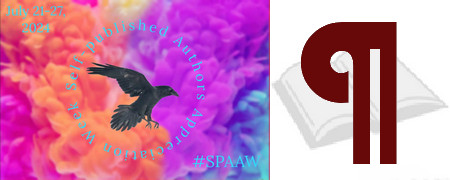
The 2024 Self-Published Authors Appreciation Week Logo was made by Witty and Sarcastic Book Club
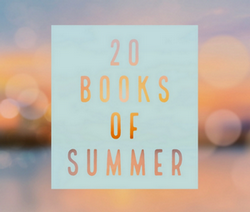
 1. This is Who We Are Now by James Bailey
1. This is Who We Are Now by James Bailey 2. Blood Reunion by JCM Berne
2. Blood Reunion by JCM Berne 3. Ways And Truths And Lives by Matt Edwards
3. Ways And Truths And Lives by Matt Edwards 4. The Running Grave by Robert Galbraith
4. The Running Grave by Robert Galbraith 5. Grammar Sex and Other Stuff: A Collection of (mostly humorous) Essays by Robert Germaux (my post about it)
5. Grammar Sex and Other Stuff: A Collection of (mostly humorous) Essays by Robert Germaux (my post about it) 6. The Camelot Shadow by Sean Gibson
6. The Camelot Shadow by Sean Gibson 7. Last King of California by Jordan Harper
7. Last King of California by Jordan Harper 8. Steam Opera by James T. Lambert (my post about it)
8. Steam Opera by James T. Lambert (my post about it) 9. The Glass Frog by J. Brandon Lowry (my post about it)
9. The Glass Frog by J. Brandon Lowry (my post about it) 10. The Legendary Mo Seto by A. Y. Chan (substitution) (my post about it)
10. The Legendary Mo Seto by A. Y. Chan (substitution) (my post about it) 11. Curse of the Fallen by H.C. Newell
11. Curse of the Fallen by H.C. Newell 12. Heart of Fire by Raina Nightengale
12. Heart of Fire by Raina Nightengale 13. Detours and Do-overs by Wesley Parker (my post about it)
13. Detours and Do-overs by Wesley Parker (my post about it) 14. Bizarre Frontier Omnibus #1 by Brock Poulson
14. Bizarre Frontier Omnibus #1 by Brock Poulson 15. Howl by e rathke (my post about it)
15. Howl by e rathke (my post about it) 16. Bard Tidings by Paul J. Regnier
16. Bard Tidings by Paul J. Regnier 17. Panacea by Alex Robins
17. Panacea by Alex Robins 18. Cursed Cocktails by S.L. Rowland (my post about it)
18. Cursed Cocktails by S.L. Rowland (my post about it) 19. Big Trouble in Little Italy by Nicole Sharp
19. Big Trouble in Little Italy by Nicole Sharp 20. The Nameless Restaurant by Tao Wong (my post about it)
20. The Nameless Restaurant by Tao Wong (my post about it)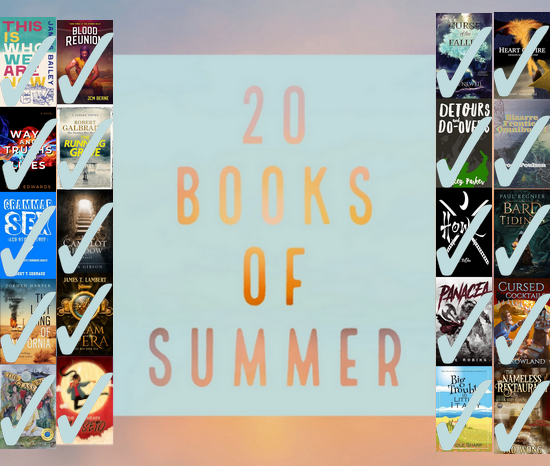


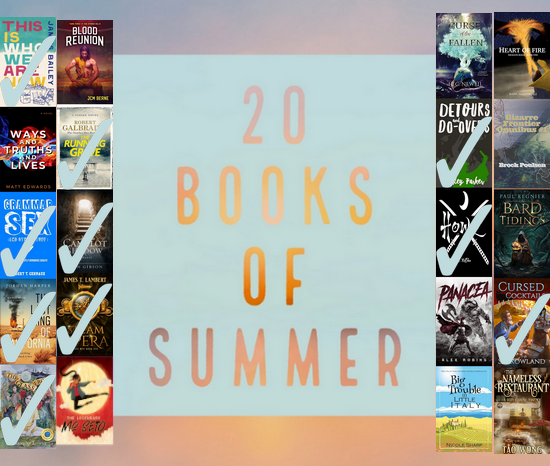
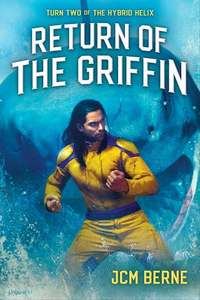


 A teleporter named “Bamf”? You know Berne chuckled/giggled to himself when he typed that.
A teleporter named “Bamf”? You know Berne chuckled/giggled to himself when he typed that.
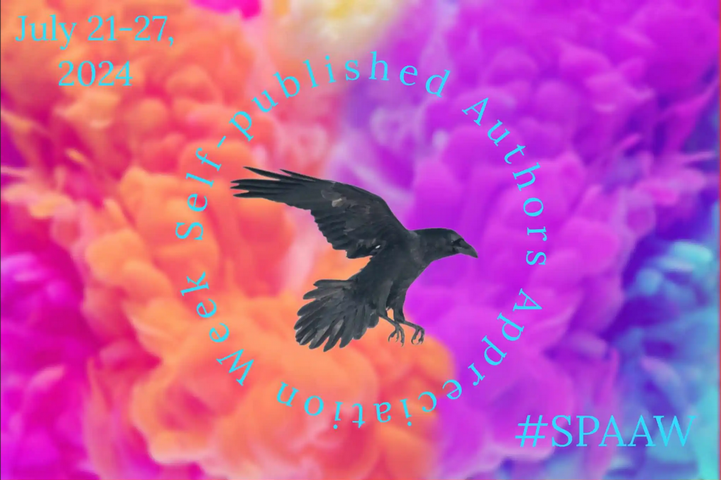
 The World Savers
The World Savers 
